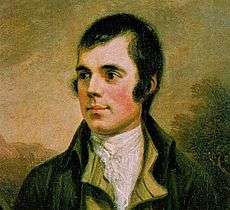Such a Parcel of Rogues in a Nation
Such a Parcel of Rogues in a Nation is a Scottish folk song whose lyrics are taken from a poem written by Robert Burns in 1791. It has continued to be associated with Scottish nationalism and also been referenced in other situations where politicians' actions have gone against popular opinion.
History
Such a Parcel of Rogues in a Nation was written by the famed poet Robert Burns in 1791. He decried those members of the Parliament of Scotland who signed the Act of Union with England in 1707, some of whom were said to have been bribed. Burns contrasted their supposed treachery to the country with the tradition of martial valor and resistance commonly associated with such historic figures as Robert the Bruce and William Wallace. The poet states that he wishes to have lain in the grave with Bruce or Wallace, than have seen this treacherous sale of Scotland in his lifetime. The lyrics obliquely reference a colonization project that became known as the Darien Scheme, an unsuccessful attempt by the Kingdom of Scotland to become a world trading nation by establishing a colony called "Caledonia" on the Isthmus of Panama on the Gulf of Darién in the late 1690s. As the Darien company was backed by about a quarter of the money circulating in Scotland, its failure left the nobles and landowners—who had suffered a run of bad harvests—almost completely ruined and was an important factor in weakening their resistance to the Act of Union. Although the scheme failed, it has been seen as marking the beginning of the country's transformation into a modern nation oriented toward business.
The melody and lyrics were published in volume 1 of James Hogg's Jacobite Reliques of 1819 (no. 36).[1]
Recordings
The song was revived in the 20th century by Ewan MacColl, whose recording of it can be found on the collection The Real MacColl. Steeleye Span later included it under the name Rogues in a Nation on their album Parcel of Rogues, and it has been covered by numerous other musicians, including The Corries, The Dubliners, Dick Gaughan, Makem and Clancy, Luke Kelly and The Bard of Cornwall.
A spoken word version was recorded by Bill Drummond of The KLF as the closer of his solo album The Man (1986).
Lyrics
The song's lyrics are in Lowlands Scots.
- Fareweel to a' our Scottish fame,
- Fareweel our ancient glory;
- Fareweel ev'n to the Scottish name,
- Sae fam'd in martial story.
- Now Sark rins over Solway sands,
- An' Tweed rins to the ocean,
- To mark where England's province stands-
- Such a parcel of rogues in a nation!
- What force or guile could not subdue,
- Thro' many warlike ages,
- Is wrought now by a coward few,
- For hireling traitor's wages.
- The English steel we could disdain,
- Secure in valour's station;
- But English gold has been our bane -
- Such a parcel of rogues in a nation!
- O would, ere I had seen the day
- That Treason thus could sell us,
- My auld grey head had lien in clay,
- Wi' Bruce and loyal Wallace!
- But pith and power, till my last hour,
- I'll mak this declaration;
- We're bought and sold for English gold-
- Such a parcel of rogues in a nation![2]
References
- ↑ Hogg, James (1819). The Jacobite relics: volume 1. Edinburgh: William Blackwood. p. 56.
- ↑ The Jacobite Relics of Scotland
External links
- Digitised copy of volumes 1 and 2 of The Relics of Jacobite Scotland by James Hogg, printed between 1819 and 1821, from National Library of Scotland.
